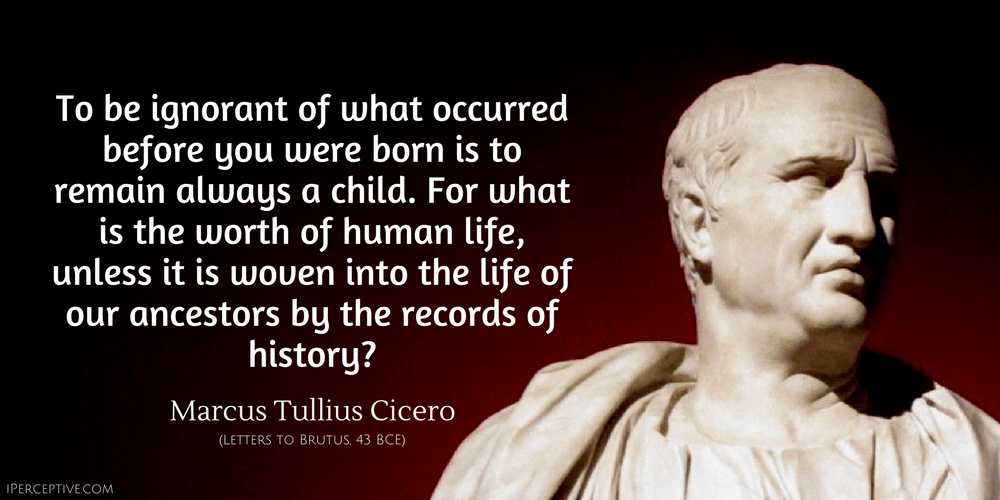Marcus Tullius Cicero Quotes

To be ignorant of what occurred before you were born is to remain always a child. For what is the worth of human life, unless it is woven into the life of our ancestors by the records of history?
While there are two ways of contending, one by discussion, the other by force, the former belonging properly to man, the latter to beasts, recourse must be had to the latter if there be no opportunity for employing the former.
The name of peace is sweet, and the thing itself is beneficial, but there is a great difference between peace and servitude. Peace is freedom in tranquility, servitude is the worst of all evils, to be resisted not only by war, but even by death.
Friendship is nothing else than an accord in all things, human and divine, conjoined with mutual goodwill and affection, and I am inclined to think that, with the exception of wisdom, no better thing has been given to man by the immortal gods.
On the subject of the nature of the gods, the first question is ‘Do the gods exist or do the not?’ It is difficult you may say to deny that they exist. I would agree if we were arguing the matter in a public assembly, but in a private discussion of this kind, it is perfectly easy to do so.
Since an intelligence common to us all makes things known to us and formulates them in our minds, honorable actions are ascribed by us to virtue, and dishonorable actions to vice; and only a madman would conclude that these judgments are matters of opinion, and not fixed by nature.
But if I err in believing that the souls of men are immortal, I willingly err; nor while I live would I wish to have this delightful error extorted from me; and if after death I shall feel nothing, as some minute philosophers think, I am not afraid lest dead philosophers should laugh at me for the error.
When I consider the wonderful activity of the mind, so great a memory of what is past, and such a capacity of penetrating into the future; when I behold such a number of arts and sciences, and such a multitude of discoveries thence arising; I believe and am firmly persuaded that a nature which contains so many things within itself cannot be mortal.
The most evident difference between man and animals is this: the beast, in as much as it is largely motivated by the senses and with little perception of the past or future, lives only for the present. But man, because he is endowed with reason by which he is able to perceive relationships, sees the causes of things, understands the reciprocal nature of cause and effect, makes analogies, easily surveys the whole course of his life, and makes the necessary preparations for its conduct.
I ask you both, why did these creators of the world suddenly wake up, after apparently having been asleep from time immemorial? Even if there was then no world, time must still have been passing. Time, I say, and not those periods of time which are measured by the number of nights and days in the course of a year. I admit that these depend upon the circular movement of the world. But from all eternity there has been an infinite time, unmeasurable by any periodical divisions. This we can understand from the analogy of space. But we cannot even conceive that once upon a time there was no time at all.
The fact is that everything which grows and flourishes contains in itself a natural heat without which it could not grow or flourish. Everything which has within it heat and fire is stirred and enlivened by their motion. And while anything grows and flourishes, this motion is steady and regular. And so long as it remains so with us, our life and consciousness continue. But when this vital warmth grows cold and finally extinct, we ourselves decline and die.
..the veins and arteries throb constantly with a fiery pulse. It has often been observed that if the heart is torn out of any animal, it continues to beat violently like a flickering fire. Therefore everything which lives, whether it is animal or vegetable, lives only by reason of the heat enclosed within it. From which it can be seen that this heat has by nature a vital force within itself which permeates the whole world.

